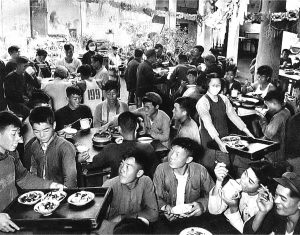Chinese Communes and the Communist Future
Our collective is finding that people are interested in discussing a communist future more than ever. We thought it might be useful to provide some information about collectivization and communes in China after the revolution, especially in light of the huge Indian protests. There, the Indian ruling class wants to convert vast agricultural land that supports 600 million people into large, corporate-owned farms. This is the opposite of what happened when the Chinese built the communes.
Collectivization of agricultural production in China began soon after the revolution, in the early 50’s. The first stage comprised mutual aid teams. Farmers pooled their land, livestock and equipment. Next were teams called cooperatives, which also shared heavy equipment. This process proceeded to the emergence of people’s communes, each of which might involve tens of thousands of people. Rural unemployment disappeared.
Leftists in China pushed a program of removing commune services from the market.
For example, because kitchens and dining were communal, food was not reliant on the market. Childcare was no longer a commodity because of communal nurseries and daycares. Some communes were more advanced than others, but most provided housing, transportation, healthcare and lighting in addition to food and childcare. They were able to become flexible. For example, it was possible for families to cook privately for special occasions.
Many people worried that collectivization would undermine family life, but the opposite happened. Families were no longer torn apart by financial worries or child care disputes. They were no longer an economic unit that people were trapped in order to survive. Relationships became better when people did not feel trapped in them.
Communes had an especially liberating effect for women. Freed from domestic slavery, they could take part fully in productive labor. Women participated as fully as men in the political life of the commune, giving leadership in every aspect.
People’s communes were the closest humanity has come to communism in modern times. They lasted nearly 20 years and were dismantled not because they failed on their own terms, but because the society they were embedded in never moved fully to communism.
The defeat of the Cultural Revolution solidified the Communist Party of China as a new capitalist ruling class. Its 1984 “Second Land Reform” dismantled collective farms and paved the way for large-scale agribusiness.
This is a mistake the ICWP will not make.
It can be hard to imagine the possibilities of life in communism; it means thinking about society and how we live together in whole new ways. We ask you to join us in imagining and fighting for life without the constraints of money, borders, and bosses; without the horrors of racism, sexism and xenophobia. This is the communist future.
— a comrade

A Communal Meal in a People’s Commune

